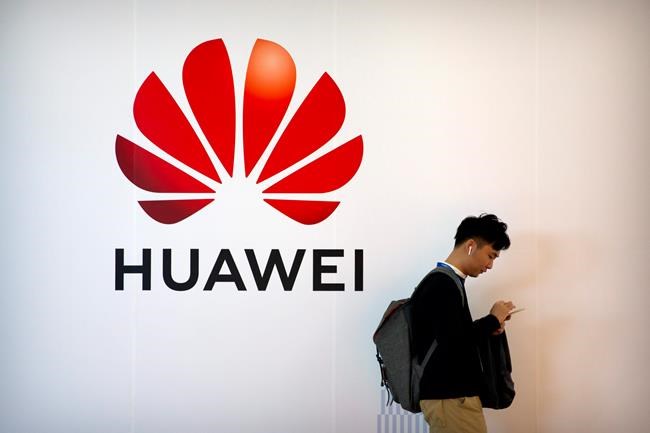US brings new charges against Chinese tech giant Huawei
Advertisement
Read this article for free:
or
Already have an account? Log in here »
To continue reading, please subscribe:
Monthly Digital Subscription
$0 for the first 4 weeks*
- Enjoy unlimited reading on winnipegfreepress.com
- Read the E-Edition, our digital replica newspaper
- Access News Break, our award-winning app
- Play interactive puzzles
*No charge for 4 weeks then price increases to the regular rate of $19.00 plus GST every four weeks. Offer available to new and qualified returning subscribers only. Cancel any time.
Monthly Digital Subscription
$4.75/week*
- Enjoy unlimited reading on winnipegfreepress.com
- Read the E-Edition, our digital replica newspaper
- Access News Break, our award-winning app
- Play interactive puzzles
*Billed as $19 plus GST every four weeks. Cancel any time.
To continue reading, please subscribe:
Add Free Press access to your Brandon Sun subscription for only an additional
$1 for the first 4 weeks*
*Your next subscription payment will increase by $1.00 and you will be charged $16.99 plus GST for four weeks. After four weeks, your payment will increase to $23.99 plus GST every four weeks.
Read unlimited articles for free today:
or
Already have an account? Log in here »
Hey there, time traveller!
This article was published 13/02/2020 (2128 days ago), so information in it may no longer be current.
WASHINGTON – The U.S. Justice Department has added new criminal charges against Chinese tech giant Huawei and several subsidiaries, accusing the company of a brazen scheme to steal trade secrets from competitors in America, federal prosecutors announced Thursday.
The new indictment also alleges the company provided surveillance equipment to Iran that enabled the monitoring of protesters during 2009 anti-government demonstrations in Tehran, and that it sought to conceal business that it was doing in North Korea despite economic sanctions there.
The company disputed the allegations in a statement and called them them “without merit.” China’s foreign ministry accused the U.S. government of “economic ebullying” and improperly using security allegations to “oppress Chinese companies.”

The new allegations come as the Trump administration raises national security concerns about Huawei, the world’s largest telecommunications equipment manufacturer, and aggressively lobbies Western allies to bar the company from wireless, high-speed networks.
The superseding indictment, brought by federal prosecutors in Brooklyn, adds to the company’s legal woes in the U.S. It adds charges of racketeering conspiracy and conspiracy to steal trade secrets to an existing criminal case in New York, where the company already faces charges of lying to banks about deals that violated economic sanctions against Iran.
Federal prosecutors in Seattle have brought a separate trade secrets theft case against the company. Meng Wanzhou, a senior Huawei executive and the daughter of the company’s founder, is accused of making false representations to banks about Huawei’s relationship with its Iran-based affiliate. She was arrested in Vancouver, British Columbia, and has yet to be extradited to the U.S.
The latest indictment, an update of a case first filed last year, accuses Huawei of plotting to steal the trade secrets and intellectual property of rival companies in the U.S.
In some instances, prosecutors said, Huawei recruited employees of competitors to steal intellectual property. The company also provided incentives to its own employees by offering bonuses to those who brought in the most valuable stolen information, and it used proxies, including professors at research institutions, in the pursuit of inside information, prosecutors said.
The stolen information included antenna and robot testing technology as well as user manuals for internet routers. One goal of the theft, the Justice Department said, was to allow Huawei to save on research and development costs.
The indictment details efforts to steal from a half dozen companies.
In one May 2013 episode, according to the indictment, a Huawei engineer removed a robot arm from the laboratory of a rival company based in Washington state, stashing the item in a laptop bag. The engineer emailed photographs and measurements of the arm to others at Huawei before the arm was returned to the company, which had discovered the theft.
At a 2004 trade show in Chicago, a Huawei employee was found in the middle of the night in the booth of a technology company, “removing the cover from a networking device and taking photographs of the circuitry inside,” prosecutors said. The employee wore a badge that listed his employer as “Weihua,” or Huawei spelled with its syllables reversed.
The indictment also lays out steps that the company to conceal its business dealings with Iran and North Korea, including by referring to both countries in internal documents by their code names.
In a statement, Huawei called the new indictment “part of the Justice Department’s attempt to irrevocably damage Huawei’s reputation and its business for reasons related to competition rather than law enforcement.”
“These new charges are without merit and are based largely on recycled civil disputes from last 20 years that have been previously settled, litigated and in some cases, rejected by federal judges and juries,” it said. “The government will not prevail on its charges, which we will prove to be both unfounded and unfair.”
Huawei’s global cybersecurity officer, John Suffolk, said there’s “no evidence” to support the U.S. allegations.
“We believe they’re deliberately misleading and hoping if they throw enough mud then some of that mud would stick,” he said in a media conference call.

Asked about the charges, a Chinese foreign ministry spokesman called on Washington to “stop oppressing Chinese businesses.”
“The United States has misused its national power to oppress Chinese companies with no proof of any wrongdoing,” said the spokesman, Geng Shuang. He spoke in a regular news briefing that was conducted over social media as part of government efforts to contain a virus outbreak by avoiding public gatherings.
“Such practice is disgraceful and immoral, and it is beneath the status of the United States as a major country,” Geng said. “Such economic bullying practice is a blatant denial of the market principle, for which the U.S. has been a self-proclaimed champion.”
Trump administration officials, including Cabinet secretaries, have recently levelled national security allegations against Huawei in an effort to encourage European nations to ban the gear from next-generation cellular networks.
Secretary of State Mike Pompeo and Defence Secretary Mark Esper are making the pitch to Western allies during a trip to Munich this week. Attorney General William Barr, in a speech last week, lamented what he said was China’s aspiration for economic dominance and proposed that the U.S. invest in Western competitors of Huawei.
The administration’s national security adviser, Robert O’Brien, asserted this week that Huawei can secretly tap into communications through the networking equipment it sells globally. The company disputes that, saying it “has never and will never covertly access telecom networks, nor do we have the capability to do so.”
____
Follow Eric Tucker on Twitter at http://www.twitter.com/etuckerAP
___
Kelvin Chan in London contributed to this report.


